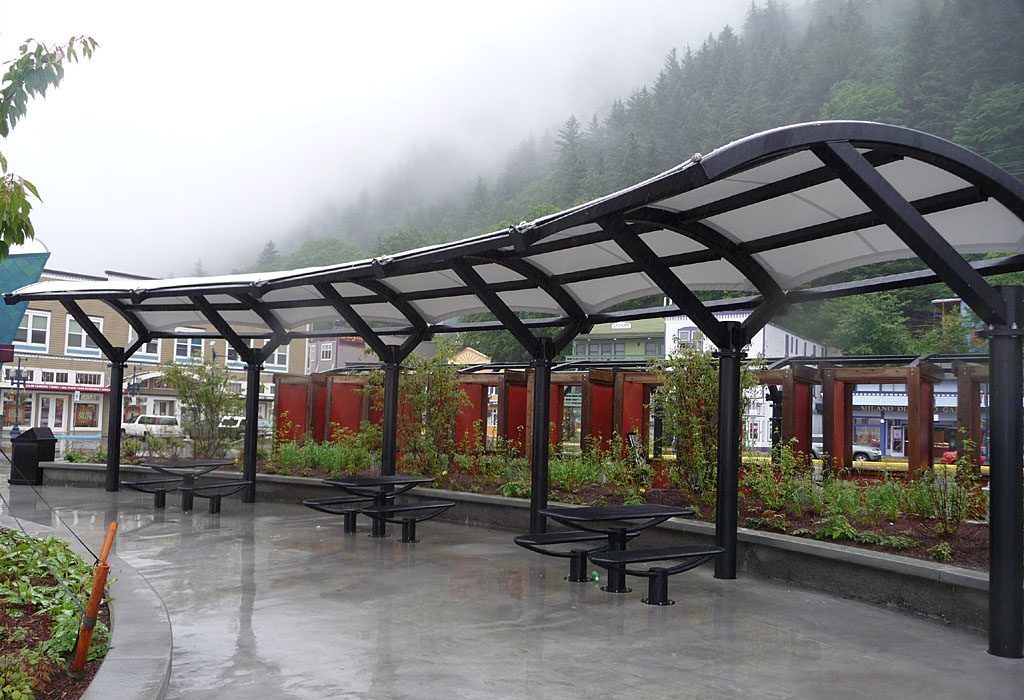 Each year, more American architects and designers are embracing the versatility and functionality of tensile membrane architecture. After all, these structures are light-weight, offer variable light transmission opportunities, can span long distances, and will improve a building’s energy efficiency – while also being cost-effective, visually dynamic, and uniquely flexible.
Each year, more American architects and designers are embracing the versatility and functionality of tensile membrane architecture. After all, these structures are light-weight, offer variable light transmission opportunities, can span long distances, and will improve a building’s energy efficiency – while also being cost-effective, visually dynamic, and uniquely flexible.
Understanding the benefits is important when you’re getting started with tensile membrane architecture – but if you’re really looking to push the limits on your design, you need to explore the performance capabilities.
Wind Performance
Perhaps one of the most common questions is whether tensile membrane architecture is suitable for windy sites. These structures can be engineered to withstand the wind-load requirements of even the harshest environments.
The engineering analyses, including a Finite Element Analysis (FEA), provide the necessary data to design optimum dimensions for the steel framework, cables, concrete foundations, and fabric elements – taking into account environmental concerns such as wind and snow-load criteria. Substantial snow loads, for example, may result in designing steeper pitches and using smaller spans.
In locations with extreme conditions, an annual maintenance check and possible re-tensioning is recommended to ensure the long-term success of the project.
Sun Performance
PVC and PTFE fiberglass membranes are the most common fabrics used in this type of architecture. PVC fabrics offer a great balance of price and performance, and top-coatings can be applied to increase the surface’s resistance to fading and UV degradation. However, PVC does have a shorter lifespan than PTFE fabrics.
If your project needs to last for more than 10 years in high UV, pollution, or humidity environments, then PTFE is the better choice. PTFE is a Teflon™-coated woven fiberglass membrane that is considered one of the most durable materials in the fabric architecture industry. Among its many benefits, PTFE is completely immune to UV degradation.
If you’re looking for the most advanced materials on the market, TiO2 Coated PTFE Membranes actually put the sun to work – using the UV rays to start a chemical reaction that cleans any pollutants, mold, or dirt from the surface.
Fire Performance
When dealing with any type of fabric product, flammability is always a concern. Depending on the occupancy, application, location, and specifications of your project, you may be dealing with very stringent or more basic fire code compliance requirements.
PVC membranes are fire retardant and can experience improved fire performance with the application of top-coatings, but PTFE fiberglass membranes offer exceptional fire performance. A tensile membrane architecture expert should help you choose the option that’s best-suited for your project.
Acoustic Performance
Whether you’re considering interior applications or you’re creating a free-standing structure, it’s important to understand the acoustic performance levels and limitations of tensile membrane architecture. A single layer of the fabric may help with minor acoustic issues, but realistically, its low mass results in minimal absorption of sound waves. However, a double skin approach with an acoustic quilt interlayer can provide a substantial impact, although it will greatly reduce the membrane’s transparency. Similarly, tensioned fabric designs are often designed to hide unsightly high-frequency acoustic foams.
Talk to a Tensile Membrane Architecture Expert About Your Project’s Performance Challenges
In the Tension Structures Division of Eide Industries, we specialize in design, engineering, manufacturing, and installation of structurally complex and creatively challenging commercial, government, and prototype design projects. We provide expertise and support for architects, landscape designers, general contractors, and property owners to develop their custom tensile membrane project ideas and construct iconic structures.
Explore the options for your next project. Contact one of our experts today by calling 800-422-6827.
